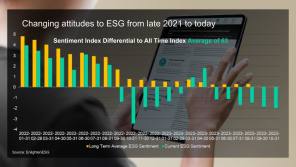
Sustainability should be reflected in product and strategy development
From climate change to Covid-19, 2020 highlighted the inextricable links between finance and the wider societal and environmental ecosystem.
It also vastly accelerated the sustainability trend in investment management. A broader understanding and application of systems thinking is now needed if the sustainability paradigm is to evolve into the mainstream of investment management.
It is rare for a single topic to challenge such long-held theories and investing paradigms all at once, yet this is the challenge of sustainable investing, and it goes to the heart of the sustainability of investing.
There are two important issues underlying this sustainability trend. Firstly; a growing awareness of the financial materiality of climate change issues, and secondly; changing societal expectations around how companies manage social issues such as the treatment of workers, customers, and the supply-chain in a multi-stakeholder model.
These considerations preceded the Covid-19 pandemic but were accentuated by it.
Growth opportunities
The premise of sustainability is that financial benefits which provide for consumption and intrinsic needs have higher utility if the environment in which they are consumed is sustainable.
It follows that the interests of the investment profession and its clients are better served by incorporating sustainability into business and investment models.
A key driver of the growth in sustainable investing is client demand. According to recent CFA Institute research, although only 19 per cent of institutional investors and 10 per cent of retail investors currently invest in products that incorporate environmental, social, or governance (ESG) factors, 76 per cent of institutional investors and 69 per cent of retail investors have interest in ESG investing.
Preferences and motivations for ESG investing vary across generations, geographies and societal segments, but generally there is greater demand for product personalisation and alignment of investments with personal beliefs.
The future growth opportunities in the sustainability product space include ESG thematic and impact products, ESG multi-asset products, climate transition strategies, and better benchmarks.
To achieve these aims, sustainability should be reflected in the governance surrounding the development of new products and strategies, including client reporting, disclosures, and incentives.
A recent CFA Institute survey found that values-based objectives - a desire to express personal values or invest in companies making a positive impact on society or the environment - are the primary motivation for ESG investing among retail investors.
This reflects a paradigm shift where investment objectives involve balancing risk, return, and non-financial impact.
The understanding and measurement of impacts, both financial and non-financial, is central to systems thinking.
Systems theory recognises the interconnectivity and reflexivity between corporate value creation and the wider ecosystem.
A deeper understanding and modelling of these interconnections can enable a better assessment of investment risks and opportunities over different time horizons.
Company activities
This is particularly important in the context of building wealth for the long term.
For example, a company’s activities – the products or services it provides, the capital and labour used in its supply chain, its energy consumption and carbon emissions – both affect and are affected by its stakeholders and the environment it operates in.
Societal norms, stakeholder expectations and customer preferences all influence a company’s activities.
Environmental impacts from a firm’s operations, or external impacts from the environment on a firm, create risks and opportunities for value creation that manifest over different time horizons. In short, there are spill-overs across different parts of the ecosystem and over time.
A holistic approach to sustainability recognises these spill-overs and seeks to integrate them in investment analysis. This type of thinking is additive and complementary to traditional investment theory. It does not require a rejection of foundational concepts.
Incorporating sustainability requires senior leadership vision and ownership, and firm-wide commitments supported by a collaborative organisational culture.
Investment leaders looking to advance the sustainability transition would do well to focus on ESG education, structure teams with access to sustainability expertise, ensure they apply systems-level thinking to the mindset of investing, and invest in IT architecture to efficiently incorporate sustainability data and analytics into the investment process.
The investment industry is evolving toward a more purposeful form of capitalism, in which sustainability considerations are embedded throughout the investment process.
By embracing systems thinking, the investment profession can orient itself to ensure both long-term and sustainable wealth for clients.
Rhodri Preece, is senior head, industry research, at the CFA Institute




